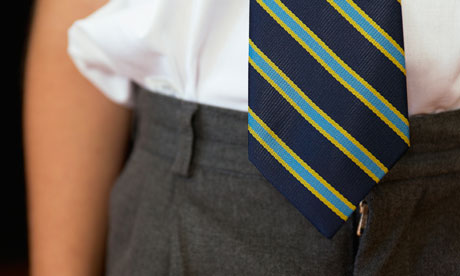
I want to find some books with a convincing and positive secondary school setting for my son who is just changing schools this year. Are any books that make secondary school look fun!
I don't think I can give you a lot of good news on this! Sadly, although primary schools such as Gene Kemp's Cricklepit Combined School, which features in her award-winning The Turbulent Term of Tyke Tiler and subsequent titles, are often shown as good places run by sympathetic teachers, secondary school are rarely portrayed with the same warmth. Except, of course, Hogwarts.
But even there, if you reconstruct the darkside in terms of contemporary tough children from "bad" homes, it shows that even for schoolboy wizards there is more to life there than feasting and flying, while bullying – which most children changing schools fear above all – is even more dangerous given the curses that the gifted and talented of Hogwarts can pull off.
From the classics, such as Tom Brown's Schooldays through Phil Redmond's Grange Hill, better-known through TV, life in secondary school in both the US and the UK is largely described as a fight for survival. Of course, there are alternative views especially set in the up-beat boarding school series of the 1930s and onwards but they were always a kind of fantasy and the school is really only a make-believe environment in which the children can develop their friendships, rivalries and the rest without parents around.
Robert Cormier knocked any ideas of schools being places of safety on the head in The Chocolate War, an outstanding book of the 1970s in which a group of boys, backed by a corrupt teacher, run a protection racket through which they crush the good, new boy hero.
Cormier believed that children should be told the truth but many objected to the portrayal and his books were banned by several US libraries on the grounds that their message would damage the young. It was very much of its time in being no holds barred about the difficulties of adolescence and the level of destruction to which teenagers might go.
Cormier was just one among several writing in the same vein and despite the objections to The Chocolate War it was a fashion that prevailed. The school story didn't bounce back partly because in the UK education was radically altered by the setting up of comprehensive schools. Authors who hadn't attend schools like that didn't have enough knowledge to write about them while polarised views about private and state education became an issue and any reference to school immediately raised questions of elitism and class.
Thirty years on, although there are lots of books with powerful and arresting school settings, everyday good experiences of children at their local schools are depressingly missing from fiction right now. Despite many children enjoying school, schools are all too often dismissed by their narrator as "just the local comp" and the character often yearns to be at a better school.
Stereotypes about chaotic lessons abound as does the "uncool" image nailed to children who want to work. American high schools are faring better – especially for older teens who don't mind a bit of paranormal alongside their education. Werewolves and vampires often hang out in surprisingly regular schools. But then, as with the magical problems of Hogwarts, the risk of unexpected still remains!
Bad news stories are more marketable than good news one and maybe it will always been fashionable to paint school in a bad light but, despite my very great respect for The Chocolate War, it would be nice to see the fashion change.
If you know of any other good news stories about schools, let us know at childrens.books@theguardian.com
Your suggestions
Rachel
Many of Anne Fine's books deal with school - in one way or another. Flour Babies is an example of this. And K M Peyton's Pennington's Seventeenth Summer describes the full range of school.

